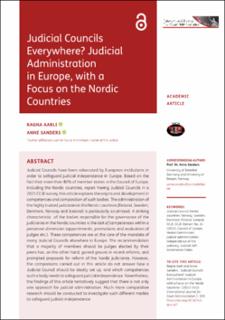Judicial Councils Everywhere? Judicial Administration in Europe, with a Focus on the Nordic Countries
Journal article, Peer reviewed
Published version

Åpne
Permanent lenke
https://hdl.handle.net/11250/3089745Utgivelsesdato
2023Metadata
Vis full innførselSamlinger
- Faculty of Law [2479]
- Registrations from Cristin [9791]
Sammendrag
Judicial Councils have been advocated by European institutions in order to safeguard judicial independence in Europe. Based on the fact that more than 80% of member states in the Council of Europe, including the Nordic countries, report having Judicial Councils in a 2021 CCJE survey, this article explores the origins and development in competences and composition of such bodies. The administration of the highly trusted judiciaries in the Nordic countries (Finland, Sweden, Denmark, Norway and Iceland) is particularly scrutinized. A striking characteristic of the bodies responsible for the governance of the judiciaries in the Nordic countries is the lack of competences within a personnel dimension (appointments, promotions and evaluation of judges etc.). These competences are at the core of the mandate of many Judicial Councils elsewhere in Europe. The recommendation that a majority of members should be judges elected by their peers has, on the other hand, gained ground in recent reforms, and prompted proposals for reform of the Nordic judiciaries. However, the comparisons carried out in this article do not answer how a Judicial Council should be ideally set up, and which competences such a body needs to safeguard judicial independence. Nevertheless, the findings of this article tentatively suggest that there is not only one approach for judicial administration. Much more comparative research should be conducted to investigate such different models to safeguard judicial independence.
